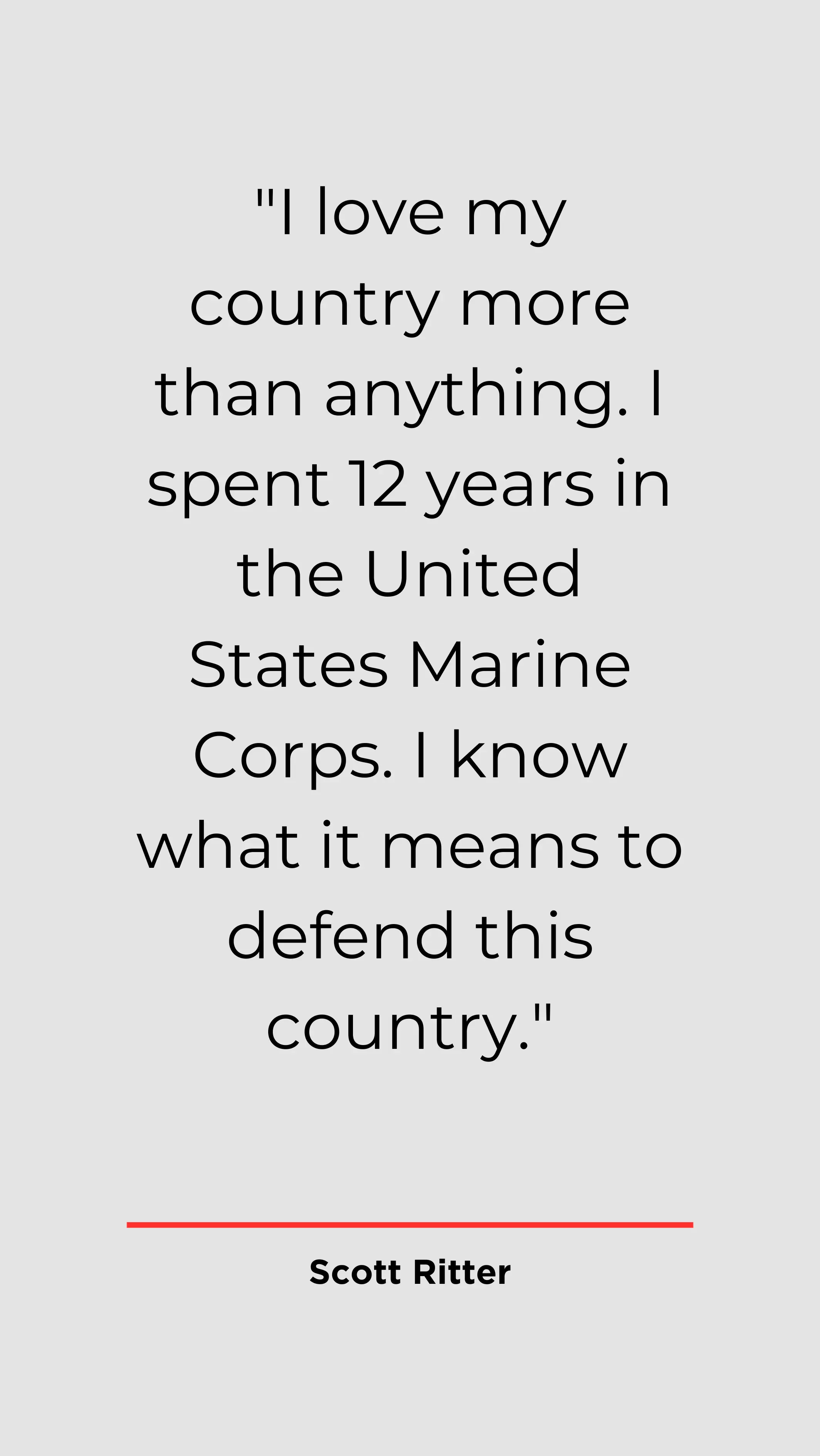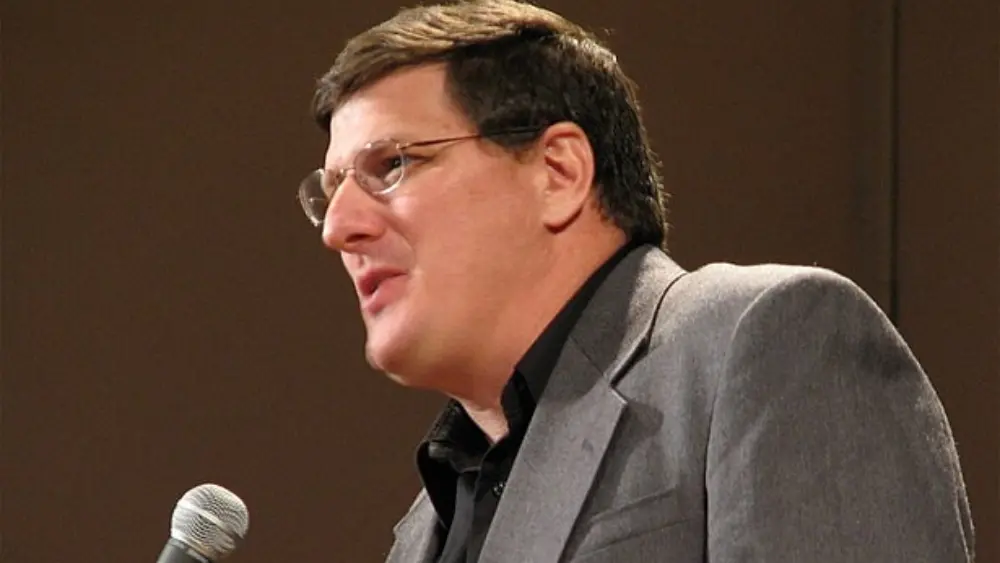Scott Ritter, a former Marine intelligence officer, became internationally recognized for his role as a United Nations weapons inspector in Iraq during a critical period of disarmament efforts. Born on July 15, 1961, in Gainesville, Florida, Ritter’s journey from military service to diplomatic responsibility placed him at the center of global efforts to dismantle Iraq’s weapons of mass destruction program.
Early Life and Military Service
Scott Ritter’s formative years were deeply influenced by a profound sense of duty and an unwavering commitment to service. From youth, he showed remarkable dedication to a greater cause, shaping his lifelong path. Born in a military family, Ritter felt a strong urge to continue their tradition of service. His unwavering purpose led him to the U.S. Marine Corps, a journey defined by discipline, sacrifice, and patriotism.
Within the Marine Corps, Ritter’s journey took a distinctive turn as he honed his skills in the field of intelligence. This decision showcased his intellectual prowess and dedication to safeguarding the nation’s interests. Ritter’s early life, driven by duty and military service, paved the way for a remarkable career in intelligence and diplomacy.
Scott Ritter: Weapons of Mass Destruction and Iraq
In the 1990s, amid Iraq’s WMD concerns, Scott Ritter played a vital role in addressing this global security challenge. With expertise in arms control and intelligence, he was the ideal candidate for the crucial weapons inspector role. Amid rising international tensions, Ritter’s qualifications and dedication became evident in Iraq’s WMD drama, central to ensuring global stability.
Ritter’s pivotal role showcased competence and unwavering commitment to disarmament and peace in a complex landscape. His actions defined his legacy as an advocate for transparency and accountability in international arms control, leaving a lasting impact.
United Nations Special Commission (UNSCOM)
In 1991, Ritter’s UNSCOM appointment marked a career turning point, deepening his global disarmament involvement significantly. His appointment signified expertise and the international community’s recognition of dedication to Iraq’s WMD program’s complex issue. UNSCOM’s Ritter: Key in Iraq’s WMD mission, a global advocate for peace, and disarmament, shaping his lasting legacy.
Ritter’s UNSCOM tenure demonstrated his firm dedication to arms control transparency and accountability, emphasizing expert-driven contributions to global security. His UNSCOM work set the stage for geopolitics, impacting Iraq’s WMD discourse and global disarmament pursuits.
Scott Ritter: Inspecting Iraq’s WMD Facilities
Scott Ritter’s role as a United Nations weapons inspector during his tenure with UNSCOM was undeniably pivotal. Ritter excelled in inspecting Iraq’s WMD sites, showcasing expertise in chemical, biological, and nuclear facilities during the mission. He navigated geopolitics to uncover Iraq’s WMD truth, becoming a key figure in global peace efforts amid high stakes.
Ritter’s relentless inspections highlighted determination and stressed global cooperation’s vital role against potential threats, emphasizing vigilance. His contributions during this period would be etched in history, leaving a lasting legacy as a courageous advocate for transparency and disarmament, ultimately influencing the trajectory of global efforts to address weapons proliferation.
Challenges and Diplomacy
Scott Ritter’s mission as a UN weapons inspector in Iraq was fraught with formidable challenges. His pursuit of disarmament objectives in the country was marked by intense negotiations and diplomatic efforts, often in the face of resistance from Iraqi authorities. These negotiations were laden with tension and complexity as they revolved around the critical issue of ensuring Iraq’s compliance with disarmament agreements. Ritter’s unwavering dedication to transparency and accountability in the inspection process meant that he had to navigate treacherous diplomatic waters, where the stakes were nothing less than regional and global security.
Despite the formidable obstacles he encountered, Ritter’s resolve never wavered. His diplomatic efforts and persistence were not only a testament to his unwavering commitment to the cause of disarmament but also a reflection of the broader international community’s determination to address the threat of weapons of mass destruction. Ritter’s work in Iraq, characterized by these challenges and the intricate diplomacy required, demonstrated the vital role of individuals like him in promoting peace and stability on the world stage.
Scott Ritter: Resignation and Controversy
Scott Ritter’s decision to resign from the United Nations Special Commission on Iraq (UNSCOM) in 1998 sent shockwaves through the international community and ignited a firestorm of controversy. His resignation came as a response to growing concerns about the politicization of inspections and alleged interference by the United States, a move that underscored the deep-seated challenges and complexities inherent in the disarmament process. Ritter’s principled stand against what he perceived as undue influence on the inspection process reflected his unwavering commitment to transparency and impartiality, even in the face of immense pressure.
Ritter’s resignation marked a significant chapter in the ongoing saga of international efforts to address Iraq’s weapons of mass destruction program, leaving a lasting imprint on the discourse surrounding disarmament and the delicate balance between politics and the pursuit of global security. The controversy surrounding his departure from UNSCOM would continue to reverberate, sparking debates about the role of inspections, diplomacy, and the responsibilities of individuals in upholding the integrity of such critical international missions.
Post-UNSCOM Career
Scott Ritter’s post-UNSCOM career was highly significant and influential after leaving the United Nations Special Commission on Iraq. He remained unwavering in addressing Iraq, WMDs, and U.S. foreign policy issues, demonstrating steadfast commitment throughout. Ritter emerged as a prolific writer, leveraging expertise to discuss global security issues profoundly and engaging in vital discourse. His writings offered insights, gaining recognition as a vocal Iraq War critic, pivotal in U.S. foreign policy’s evolution.
Ritter’s post-UNSCOM career showcased his unwavering dedication to promoting transparency, accountability, and diplomacy in the realm of international affairs. His willingness to challenge the status quo and speak truth to power solidified his legacy as a passionate advocate for peace and responsible foreign policy, making him a respected figure in discussions about Iraq, WMDs, and the broader geopolitical landscape.

Scott Ritter: Legacy and Impact
Scott Ritter’s legacy: staunch disarmament commitment, unwavering resolve amid formidable challenges. As a UN inspector in Iraq, Ritter showed dedication to global security through transparency and accountability. He navigated diplomatic complexities, a resolute advocate for peace and responsible foreign policy in treacherous waters of international diplomacy.
Post-UNSCOM, Ritter’s activism, and critiques of U.S. foreign policy solidified his global impact in the years that followed. His outspokenness on Iraq, WMDs, and the Iraq War reminded us of global decision consequences, shaping discourse on geopolitics. Ritter’s legacy endures, a testament to principled voices pursuing a secure, peaceful world, emphasizing the need for such voices.










